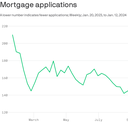Home sales hit rock bottom last year. Now, there are signs of a bounceback

In 2023, existing home sales fell to their lowest level in nearly 30 years, but now there are some early signals that the market is picking back up.
Why it matters: If the trends hold — and that is a big "if" — housing market activity hit bottom in 2023, and more homes will be bought and sold in the coming months.
The big picture: This is all about mortgage rates, which nearly touched 8% last year, putting the housing market into a deep freeze.
- But now they're heading back down — hitting 6.6% last week — and that spurred market activity.
- The market looks better than it did in the fall when rates closed in on 8%, said Chen Zhao, Redfin's economic research lead. That may have been a bottom for home sales.
- "But it still remains an open question how 2024 will shape up, how much better will it be?"
State of play: Mortgage applications have been ticking up since rates peaked in late October.
- Pending home sales jumped 4% in December from the previous month, according to data tracked by Redfin.
- They rose 6% from December 2022, the largest annual increase since June 2021.
- Even the lock-in effect that keeps homeowners in place appears to be easing a little: 21% of homeowners surveyed by Zillow in Q4 2023 said they were considering selling their house within the next three years, up from 15% a year ago.
Yes, but: Last January there were similar green shoots after mortgage rates fell back to around 6%; however, rates then went back up and the green shoots wilted.
Be smart: This time around, the outlook for rates looks more clear. Economists expect cuts this year and Fed officials now foresee them, as well.
- That's changed consumer expectations.
In a survey conducted by Fannie Mae last December, 31% of Americans said they expected mortgage rates to fall over the next 12 months, the highest share since the survey began in 2010 — and a clear sign of optimism about the housing market.
- "[F]or the first time in our National Housing Survey's history, more homeowners, on net, believe mortgage rates will go down than go up," said Mark Palim, deputy chief economist at Fannie Mae, in a statement.
- An outlook like this may incentivize some to list their home for sale, he said.
Zoom out: The high rates of 2023 have likely changed expectations for buyers and sellers, by establishing a new anchor that folks use to assess whether or not it's a good time to take out a mortgage.
- How it works: Anchoring bias is a well-established concept in behavioral economics that finds that people latch on to the first piece of information they find as a reference point when making a decision.
- For example: You go jewelry shopping and the first necklace you like costs $1,000. After that, any pieces you see for a less feel like a steal. Or a car sales rep initially shows you the priciest stuff on the lot, when you find a few SUVs cheaper than the first few vehicles — you feel like it's a good deal.
The bottom line: When rates nearly doubled in 2022, many folks might have had an old anchor in mind — the good old days of 3%-ish mortgage rates. By comparison, the rising rates felt pretty high.
- Now, the anchor is 8%, so rates below 7% feel more reasonable.